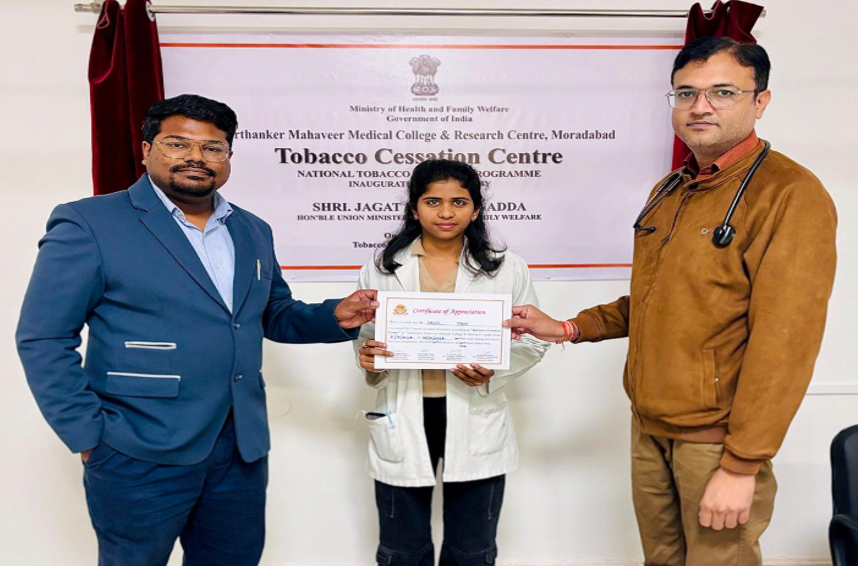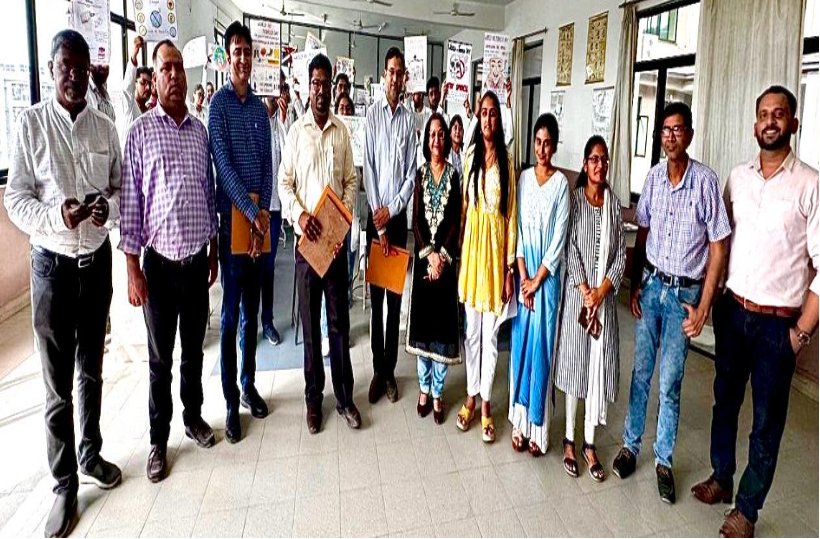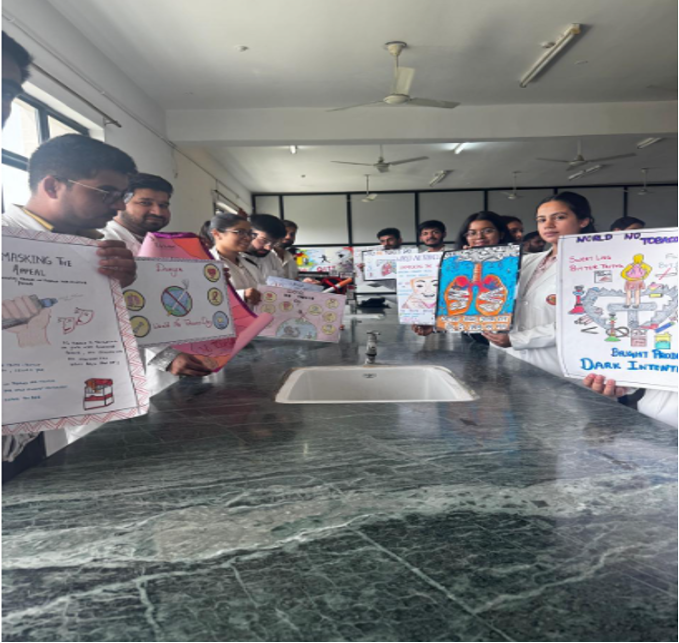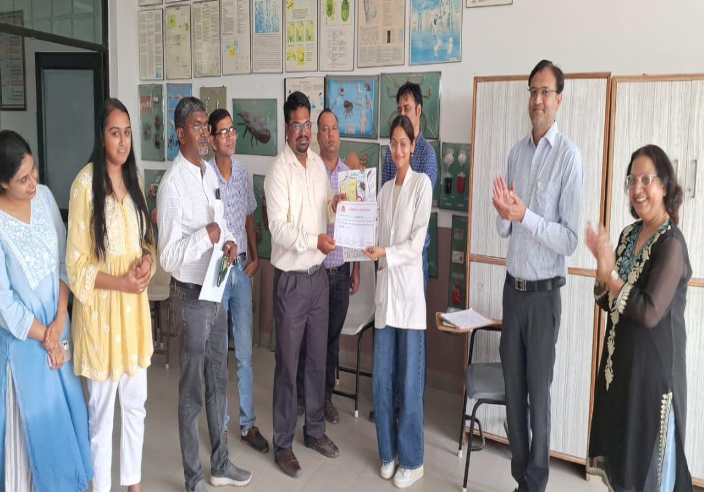
Tobacco Cessation Awareness Activities at Teerthanker Mahaveer University
Promoting a Culture of Health and Responsibility
Teerthanker Mahaveer University (TMU), as a socially responsible and health-conscious institution, has
always stood at the forefront of initiatives that promote the physical, mental, and environmental
well-being of its stakeholders. Reinforcing its long-standing commitment to Sustainable Development Goal
3 (Good Health and Well-being), the University, through its Tobacco Cessation Committee, organized a
series of engaging awareness activities aimed at spreading the message of tobacco-free living.
The campaign was conceptualized as a multidimensional effort combining education, creativity, and advocacy—demonstrating how knowledge and participation can work hand-in-hand to drive social transformation within a university ecosystem.
The Tobacco Cessation Committee, constituted under the directives of the Smoke-Free Campus Policy and aligned with national anti-tobacco laws (COTPA 2003), serves as a vital instrument in ensuring TMU’s proactive stance toward health promotion and disease prevention. The committee comprises faculty members from diverse disciplines, public-health experts, NSS coordinators, student representatives, and administrative officers. Together, they function with the objective of creating sustained behavioral change and empowering young adults to become ambassadors of a tobacco-free society.
Objectives of the Campaign
The primary objectives of the Tobacco Cessation Awareness Week were:
- To educate students and staff about the harmful effects of tobacco use and second-hand smoke exposure.
- To sensitize the campus community regarding the legal implications of tobacco sale and consumption within educational premises.
- To encourage behavioral change through positive messaging and peer-driven communication.
- To promote creative expression as a means of advocacy through competitions such as poster-making, elocution, and role play.
- To celebrate the success stories of individuals who have quit tobacco, thereby motivating others toward cessation.
- To reinforce TMU’s identity as a 100 percent Smoke-Free and Health-Promoting University.
Inaugural Session and Awareness Talk
The campaign commenced with an inaugural ceremony organized at the Central Auditorium of the University. The session was presided over by the Pro Vice-Chancellor (Academics) and attended by Deans, Directors, faculty, and over three hundred students from various faculties. In his opening remarks, the Chairperson of the Tobacco Cessation Committee highlighted that tobacco use remains one of the leading preventable causes of death globally and that educational institutions must play a pivotal role in shaping attitudes toward healthier choices.
Following the inauguration, a keynote lecture titled “Tobacco Kills — Knowledge Can Save” was delivered by Dr. Pradeep Tangade, Professor and Head, Department of Public Health Dentistry, Teerthanker Mahaveer Dental College & Research Centre. Drawing from epidemiological data, Dr. Tangade discussed the physiological effects of nicotine dependence, the economic burden of tobacco-related diseases, and the psychosocial factors influencing youth addiction. He emphasized the importance of early intervention and community-based cessation programs, inviting students to view themselves as change agents in the fight against tobacco.
The lecture was followed by an interactive session where participants shared personal reflections, misconceptions, and questions regarding cessation strategies. The discussion reinforced the notion that quitting tobacco is both a personal decision and a social responsibility. Informational leaflets and posters were distributed among the audience, outlining the harmful effects of smoking and smokeless tobacco products.
Creative Expression as a Medium of Advocacy
Recognizing that awareness becomes more powerful when blended with creativity, the Tobacco Cessation
Committee curated a series of student-centered competitions under the theme “Choose Life — Say No to
Tobacco.” Each event was designed to inspire critical thinking and emotional engagement while
strengthening students’ ability to communicate powerful messages to their peers.
Each event was designed to inspire critical thinking and emotional engagement while strengthening
students’ ability to communicate powerful messages to their peers.
Poster-Making Competition
The poster-making competition drew enthusiastic participation from students across various disciplines, including Dental Sciences, Nursing, Pharmacy, Paramedical Sciences, Management, and Engineering. Using a variety of media—hand-drawn sketches, digital illustrations, and mixed-media collages—students depicted the devastating consequences of tobacco addiction and the hope of recovery through cessation.
Posters carried impactful slogans such as “Don’t Burn Your Future — Quit Today”, “Health Is Fashion — Tobacco Is Not”, and “Your Lungs Deserve Better.” Faculty mentors commended the creativity and social relevance demonstrated by the participants. An exhibition of the top entries was later organized in the University Gallery, attracting significant attention from staff and visitors
Elocution Competition
Parallel to the visual arts event, an elocution competition was held under the subtheme “Youth and the Power of Choice.” Students spoke passionately on the physiological, psychological, and societal impacts of tobacco use, weaving personal stories, statistical evidence, and moral appeals into persuasive speeches.
The competition provided an avenue for students to enhance their communication skills while advocating for positive behavioral change. Judges evaluated contestants based on content accuracy, clarity, confidence, and originality. The event revealed the deep understanding and empathy that TMU students possess regarding public-health issues.
Role-Play and Skit Presentation
Adding an element of performance and humor, the role-play segment showcased dramatizations of everyday scenarios illustrating peer pressure, addiction, and recovery. Student groups enacted situations such as “A College Canteen Conversation,” “The Family Intervention,” and “The Clinic Visit.” Through short but emotionally charged performances, they demonstrated the gradual psychological grip of tobacco and the transformative power of support and awareness.
The skits concluded with strong moral takeaways—choosing health, saying no to peer pressure, and seeking help when needed. The interactive nature of the role plays kept the audience engaged and helped normalize conversations about addiction and support mechanisms.
Evaluation and Recognition
To appreciate the creative efforts and advocacy skills displayed by students, the committee constituted a jury panel comprising faculty from Public Health Dentistry, Nursing, Behavioral Sciences, and Mass Communication. Entries were evaluated based on creativity, content accuracy, relevance to the theme, and clarity of message.
Winners were felicitated in a formal award ceremony held at the University Auditorium. Certificates of merit and mementos were distributed to the top three participants in each category by the Hon’ble Vice-Chancellor and members of the Tobacco Cessation Committee. The felicitation not only acknowledged excellence but also reinforced the University’s support for student-led social campaigns.
The ceremony concluded with a collective pledge by all attendees to maintain the smoke-free spirit of TMU and to carry the message of wellness beyond the campus boundaries.
Community Outreach and Advocacy Extension
To extend the impact of campus activities, selected student volunteers and faculty from the Tobacco Cessation Committee conducted outreach sessions in nearby schools and community centers in Moradabad. These sessions included short talks, poster exhibitions, and role-plays replicating the campus performances. The initiative fostered collaboration with local health authorities and NGOs working on tobacco-control programs.
Furthermore, the University leveraged its digital platforms to sustain the momentum. Articles, social-media posts, and e-banners carrying anti-tobacco messages were circulated during the week, achieving extensive engagement among students and alumni. The Health Sciences faculties also conducted mini-surveys to assess changes in awareness levels post-campaign, recording an encouraging increase in students’ understanding of tobacco’s harmful effects and available cessation resources.
Integration with Institutional Policies and SDG Goals
The event series was not an isolated initiative but a reinforcement of TMU’s overarching Smoke-Free Campus Policy and its alignment with national and global frameworks:
- National Tobacco Control Programme (NTCP) guidelines advocate institutional leadership in prevention and cessation efforts.
- SDG 3.3.6 focuses on health promotion and reduction of substance abuse through policy and awareness interventions.
- TMU’s internal quality mechanisms under the IQAC and Environmental Well-being Committee ensure that every awareness campaign contributes measurable outcomes toward institutional sustainability metrics.
By embedding the Tobacco Cessation Committee’s work within these frameworks, the University establishes a continuum between policy formulation, student engagement, and community benefit.
Feedback and Impact Assessment
Feedback collected from participants and attendees indicated a strong positive response.
- Over 85 percent of student respondents expressed increased awareness about the legal and health consequences of tobacco use.
- More than 70 percent committed to becoming advocates for a smoke-free environment within their peer groups.
- Faculty members reported that the creative competitions served as effective tools for emotional engagement and long-term learning retention.
The campaign also sparked discussions within student clubs about introducing “Quit Tobacco Support Groups” and regular wellness circles, further demonstrating behavioral shifts inspired by the initiative.
Voices from the Campus

This event helped me understand that saying no to tobacco is saying yes to life,” shared a nursing student who designed a poster highlighting the lungs’ journey from darkness to light.
— Pharmacy Student

A faculty mentor from Medical Sciences remarked, “When education, creativity, and compassion converge, real transformation happens. These young advocates embody the future of public health.”
— Dean, Agriculture Sciences
Sustainability and the Way Forward
Building upon the success of this initiative, the Tobacco Cessation Committee has proposed a
comprehensive annual calendar of activities integrating health education, peer mentorship, and policy
enforcement.
Future plans include:
- Launch of an E-Wellness Portal with self-assessment tools for tobacco dependence.
- Monthly awareness newsletters featuring facts, success stories, and cessation tips.
- Collaborations with the District Health Department for de-addiction counseling camps.
- Research projects assessing the behavioral outcomes of anti-tobacco campaigns within higher-education institutions.
- Integration of tobacco-related case discussions within academic modules of Health Sciences and Social Work programs.
Conclusion
The Tobacco Cessation Awareness Activities conducted under the aegis of the Tobacco Cessation Committee
reaffirm TMU’s holistic vision of education—where learning extends beyond classrooms to shape healthier
individuals and societies.
The initiative embodies the University’s guiding principles of care, compassion, and community
engagement, translating policy into palpable action.
By empowering students to articulate, create, and perform against tobacco use, TMU has transformed
awareness into movement—one that champions health, dignity, and sustainability.
The campaign’s success underscores that when an institution invests in the wellness of its people, it
not only strengthens individual lives but also builds the moral and social capital of the nation.
Teerthanker Mahaveer University thus continues to lead by example—nurturing minds, protecting health,
and inspiring generations to breathe free.




